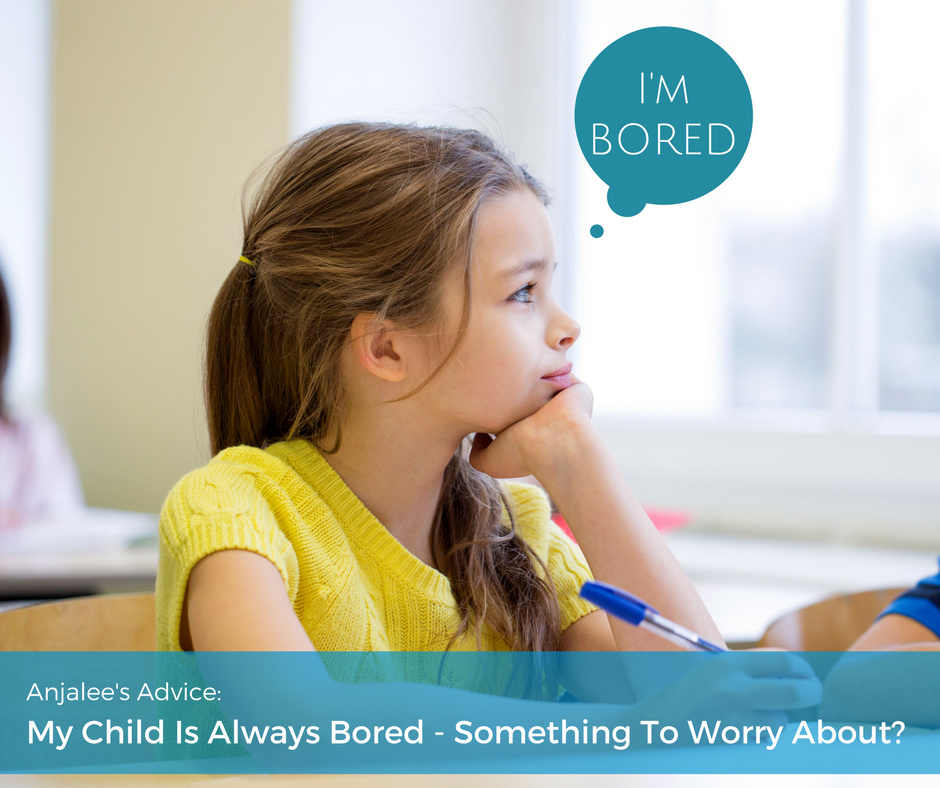
How many times in the last week alone has your child said: “I am so bored!” Maybe you were busy making dinner and could not play with him, or she had plans to go outside and play, but the weather changed to an ice-cold drizzle and playing outside wasn’t an option anymore.

Or, you are just returning to the car after a special outing to the zoo or their favorite ice cream store. The kids are not even buckled in and their complaints of boredom come rushing at you, as if they had been sitting in the car the past few hours instead of doing something fun. No matter what the reason or the situation is — a child complaining of being bored can be very frustrating!
In my role as school psychologist, I have seen many kids with the same problem, but for different reasons. Today, I want to explore these triggers with you and find out when it is okay to be bored (and what you and your child can do about it), and when it is something that should be explored further because sometimes unchecked boredom can lead to negative attention-seeking behavior, or it may have underlying causes that your child needs help with.
It’s Okay For A Child To Be Bored Sometimes
As parents in this busy, always-on-the-go world, we often feel we need to keep our children constantly entertained. If they are bored, we are not doing our job.
But let me start by saying this — a little boredom, once in a while, has never hurt a child. It’s okay to be bored on a long car ride with nothing else to do, or when plans are interrupted by something out of our control.
If handled right, your child can turn this frustrating situation into an opportunity. Children need unstructured time to play, and must learn to enjoy “alone time” — two very different but crucial stepping stones to a healthy adult life. This gives them a chance to explore something new, something they’re able to do by themselves. Maybe they’ll stumble upon something they really enjoy!
What can you do as a parent?
The best thing you can do as a parent is to plan ahead and communicate.
- Communicate: Find out why are they bored. Are they whiny because they want your attention? Do they want to play with someone? Or is something else going on?
- Planning Ahead: If you have a long car ride ahead of you, prepare with toys, games (e.g., BrainQuest Question & Answer Challenges) and other things to keep your child occupied.
- Give Options: Work together with your child to come up with a plan. Ask, “What can you do if you are feeling this way? What other activities could you do?” Together, come up with a bunch of activities your child truly enjoys (such as drawing or playing with cars or dolls), and make these accessible without your help.
- Spend Quality Time: Often, children say, “I’m bored,” but secretly mean, “I want you to play with me.” Spending just 15-30 minutes on the floor with your child playing cars or dolls is sometimes all they want, and it is one of the best ways to deepen the bonds with your child.
Being Bored As A Symptom Of Something Else
While it is okay to feel bored once in a while, you should start paying closer attention if the frequency of complaints increases or if the complaints becomes more persistent. Also, keep a watchful eye to see if your children are acting out or if they become withdrawn and isolated.
Keep in mind, every child communicates in his or her own special way, so feeling bored can mean a lot of other things:
- They’re struggling in school. If a child has a hard time wrapping his head around a certain subject or concept, such as fractions or conjugations, he might check out mentally, stare into space, or become frustrated.
- The subject matter is too easy or progression is too slow. On the other side of the spectrum, a child can also feel that something is too easy. Often, they will voice their frustration as, “I already know this!” or “This is for babies!”
- They feel left out. This often happens in physical education or subjects where children can measure themselves against their peers. If they feel they are not very good in basketball or another sport, they feel left out or isolated, and they often express it as boredom.
- Social or peer problems. Another reason children might say they are bored is that they have a hard time making friends, or something is going on in their social surroundings or peer group that bothers them.
What can you do as a parent?
There are many ways you, as a parent, can help your child through this phase. What is most important, however, is finding out why he or she is feeling like this. What is the underlying problem? Once you know that, you can come up with different strategies on how to tackle it:
- Talk to your child’s teachers. Your child’s perception of the problem might not be validated by their teachers, and it is important to let them know about it as soon as you can. Together, you can sit down and develop a plan for, perhaps, additional tutoring, special attention in class, evaluation for a learning disability, or added challenges.
- Give your child words to use to express their different feelings. Children often lump different feelings (frustration, sadness, lack of self-confidence) into the “bored” category. Explain to them what “bored” means, and let them discover when they are not actually bored. You can say something like this: “When you are supposed to do math but you feel bored, is that the same feeling you get when you sit in the car with nothing to do, or does that feel differently? If so, how does it feel?”
- Watch for red flags. There are some red flags that you should look out for. Take notice if your child engages in negative attention-drawing behavior, starts drinking alcohol, starts smoking, eats out of boredom, watches TV excessively, plays inappropriate virtual games online, participates in chatrooms that they should not be in, posts things on social media just to get attention, or even acts like a cyberbully.





